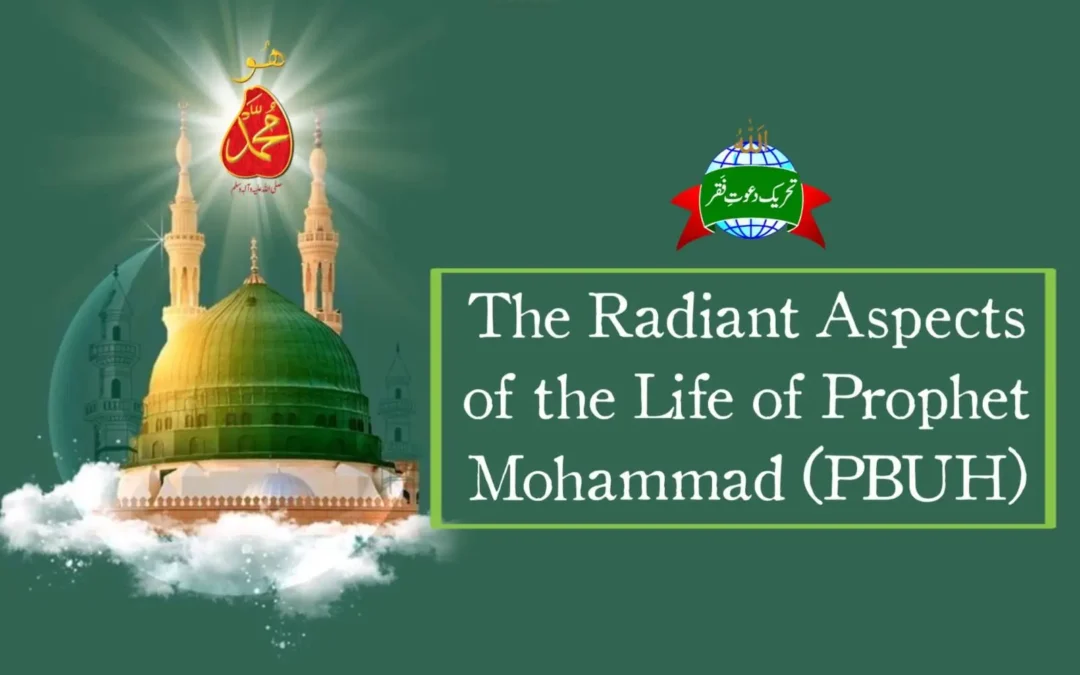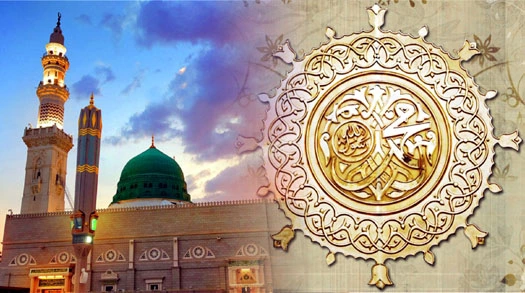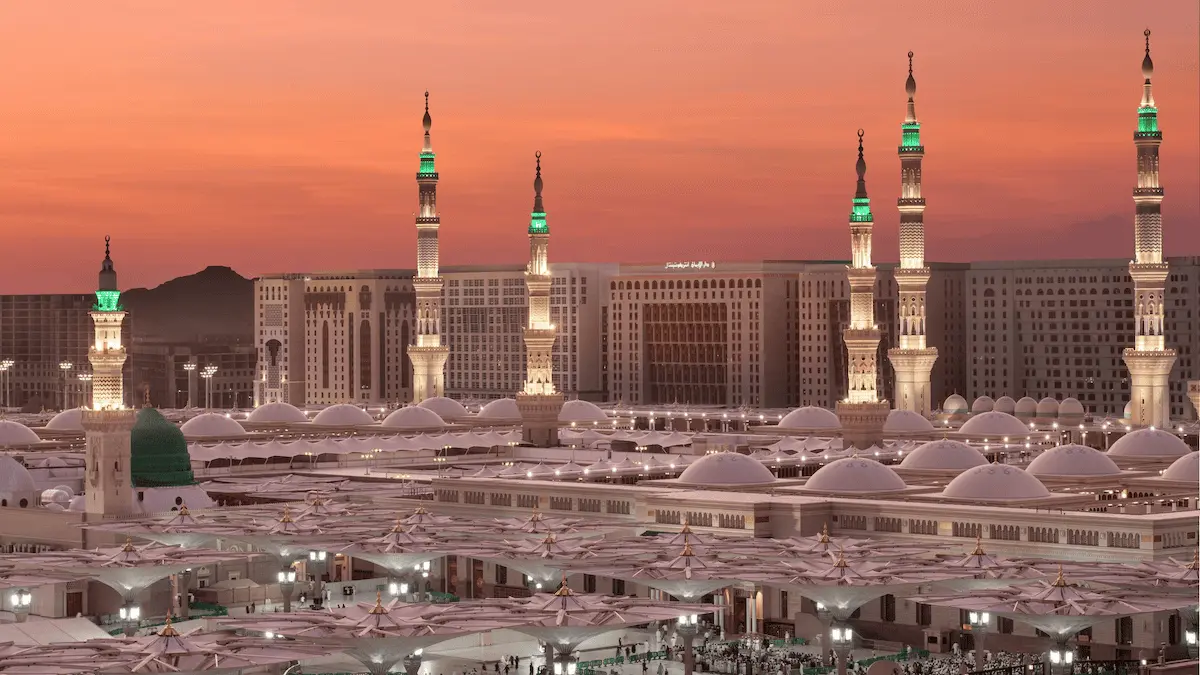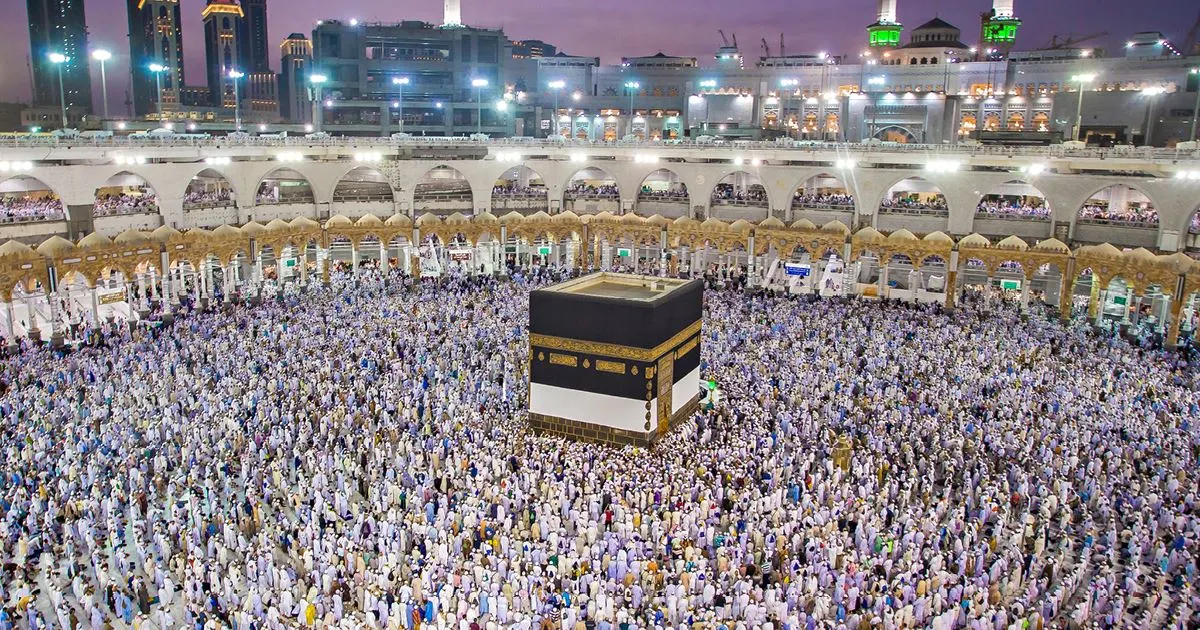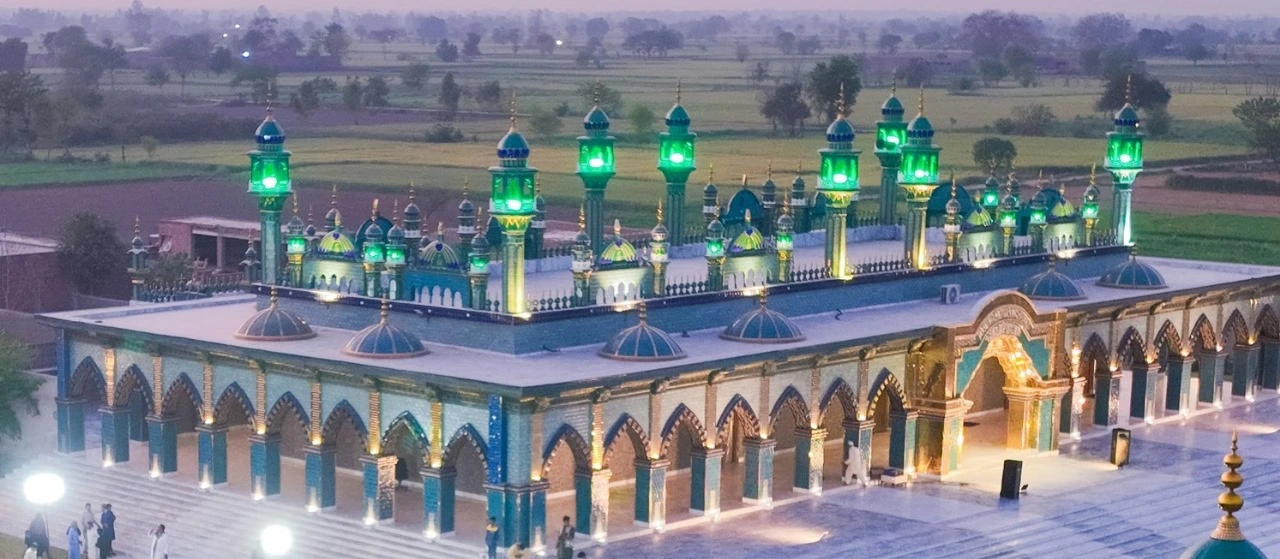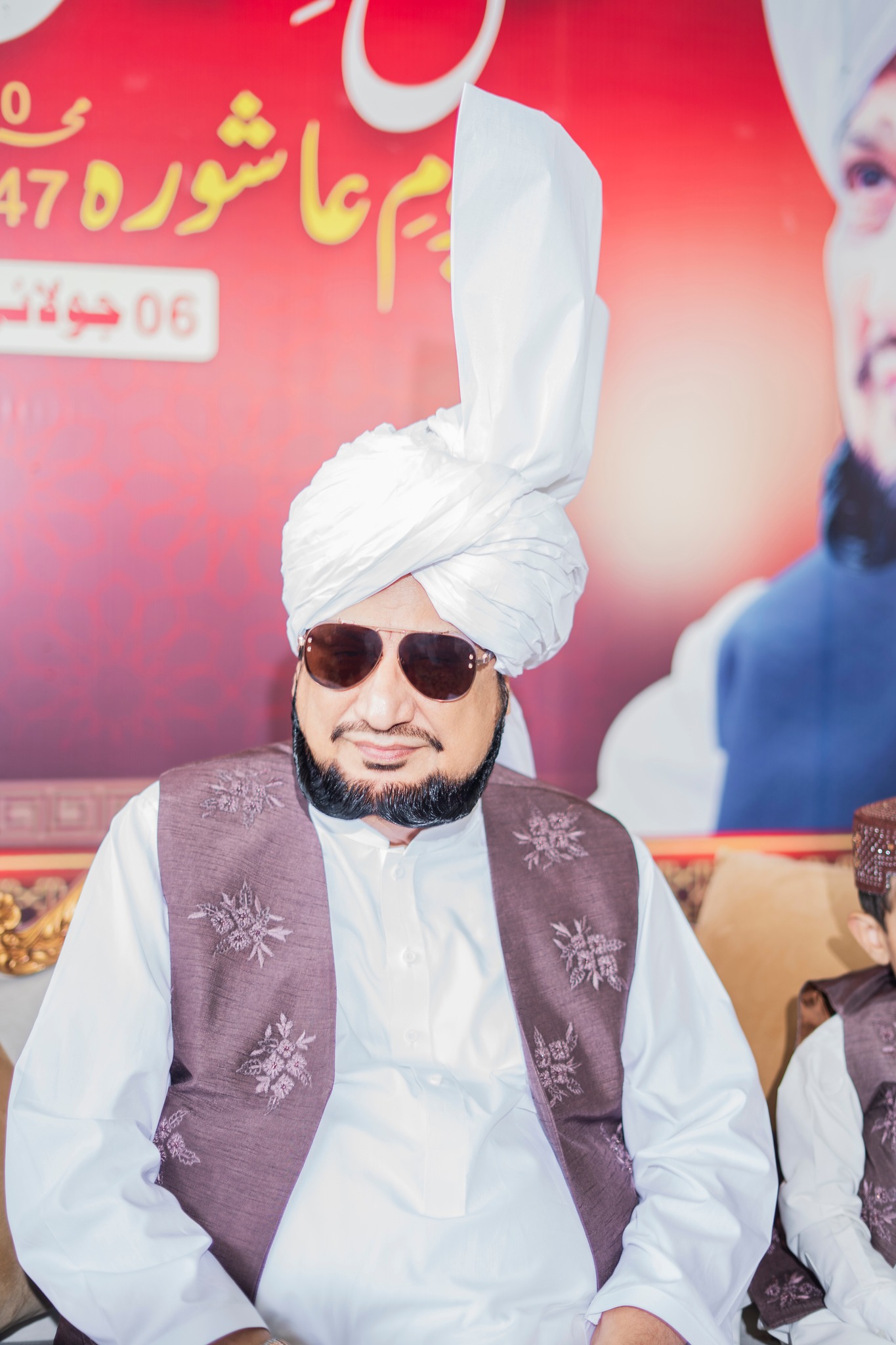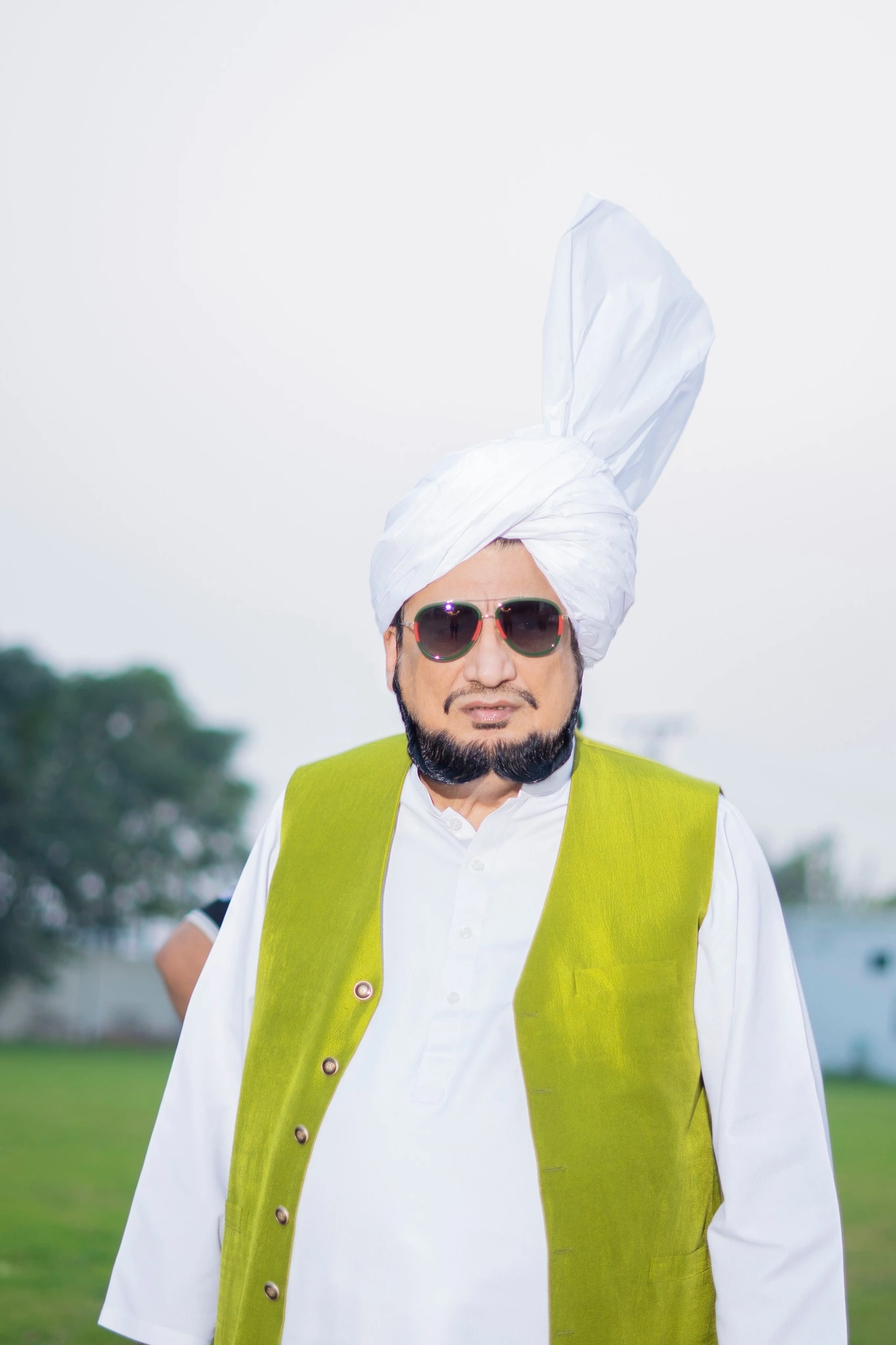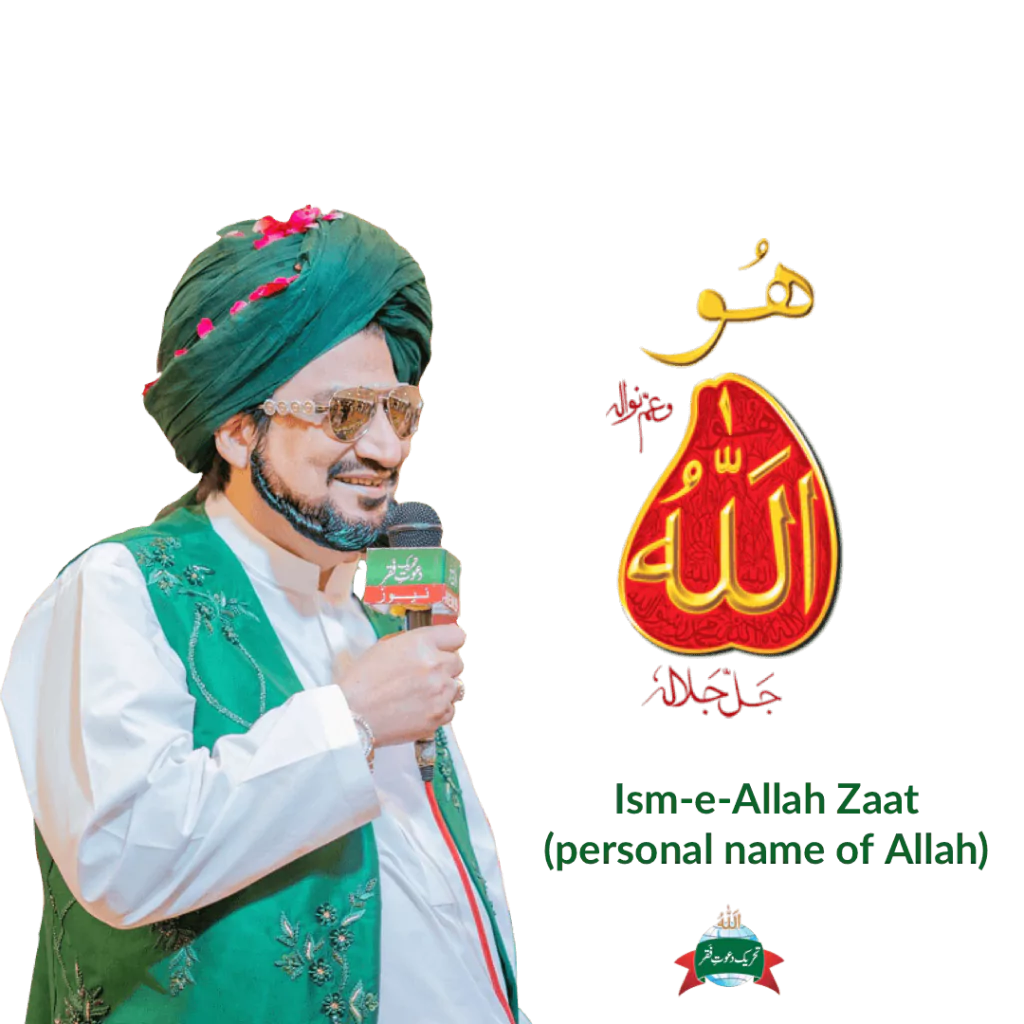The life of Prophet Mohammad serves as a timeless model for humanity, exemplifying faith, morality, justice, and compassion. His teachings not only eradicated ignorance and superstition in pre-Islamic Arabia but also laid the foundation for a society rooted in knowledge, equality, and ethical conduct. The Prophet’s guidance shaped communities, inspired followers, and established principles that remain relevant even today.
In the present age, the Perfect Spiritual Guide (Murshid Kamil Akmal) continues this sacred legacy. Acting as the Prophet’s spiritual successor, he guides individuals and communities toward inner purification (tazkiyah), moral excellence, and Divine love. His teachings help people free themselves from materialism, spiritual negligence, and misconceptions about religion. Through his guidance, disciples learn to balance faith, knowledge, and character, embracing values such as humility, patience, compassion, and sincerity.
The Perfect Spiritual Guide mirrors the Prophet’s approach by fostering justice, equality, and ethical living. In his gatherings, distinctions of race, wealth, or social status are set aside, creating a space where all are treated with respect and love. Just as the Prophet used wisdom, patience, and practical solutions to resolve societal challenges, the guide imparts spiritual and worldly guidance that cultivates lasting transformation in hearts and minds.
Importantly, the role of the guide is not to claim prophethood or alter religious law, but to revive the Prophet’s teachings in their true essence. He connects people to the spirit of the Prophet’s life, guiding them to practice faith with sincerity and devotion. Through personal attention, spiritual training, and the powerful influence of his presence, the guide shapes disciples into true believers, capable of leading purposeful and morally upright lives.
This spiritual guidance ensures a continuity of the Prophet’s mission, extending the benefits of faith, knowledge, and ethical living to every generation. The perfect spiritual guide bridges the gap between historical teachings and contemporary challenges, providing a practical path to Divine proximity and personal transformation.
If you seek a deeper understanding of faith, moral excellence, and inner peace, explore the guidance of the Perfect Spiritual Guide. Align your life with the timeless teachings of the Prophet, cultivate your spiritual potential, and embark on a journey of true transformation.
The Radiant Aspects of the Life of Prophet Mohammad
In human history, very few personalities have presented a complete and timeless model for mankind in every aspect of life. Among them, the one unmatched figure is none other than Prophet Mohammad. The life of Prophet Mohammad, his seerah, and his teachings continue to be a guiding light for millions even today.
Before his blessed arrival, Arab society was engulfed in ignorance, cruelty, and moral decline. Daughters were buried alive, tribal rivalry dominated the culture, and justice was almost unknown. In such a dark age, he came as a light of guidance. Within only twenty-three years, he not only brought about a great revolution but also established eternal principles for the welfare and progress of humanity—principles that remain practical for every era.
The Radiant Example of the Seerah of Prophet Mohammad
Every aspect of the Seerah of Prophet Mohammad shines with guidance. Whether it was his life before prophethood or his struggle after the Divine call, his example remains unmatched. The patience and steadfastness of the Meccan period, the justice and governance of the Medinan era, and both his personal and collective life—all stand as radiant models for humanity.
In the blessed personality of Prophet Mohammad, multiple qualities were gathered in perfection. He was a successful leader, author, judge, teacher, military commander, ruler, husband, father, and friend. Such a combination of excellence is not found anywhere else in creation.
Through his words and actions, he presented a model that was not merely a set of theories but a complete and practical guide for real life. Let us now look into some of these radiant aspects of the life of Prophet Mohammad which, even today, provide timeless lessons and guidance for us all.
Ending Disbelief and Spreading the Call of Tawheed
After his appointment as a Prophet in Makkah, the first and foremost mission of Prophet Mohammad was to end disbelief and polytheism. He invited people to the Oneness of Allah. This was a deeply challenging and sensitive task, for Arab society had been drowned for centuries in idol worship, tribal pride, and moral decline.
To uproot these layers of disbelief and to ignite the flame of faith in people’s hearts, Prophet Mohammad adopted a gradual and wise strategy. This method combined spiritual, intellectual, and practical aspects at the same time. The greatest foundation of disbelief was polytheism, meaning associating partners with Allah.
Prophet Mohammad struck directly at this belief. He called people to pure Tawheed, the absolute oneness of Allah. Through the Quran, people were made to realize the helplessness of idols and the supreme authority of Allah over all creation.
The message of Surah Al-Ikhlas
“Say: He is Allah, the One. Allah, the Independent, Carefree. He has not begotten nor was He begotten. And nor is there anyone equal to Him.”
This chapter is a powerful declaration of Tawheed. Prophet Mohammad taught that worship must be for Allah alone. Help should be sought from Him, and trust should be placed only in Him. He instilled this lesson in the minds of people: idols can neither benefit nor harm anyone.
Moral Reform and Character Building
Disbelief was not limited to corrupted beliefs. It was also tied to deep moral decay. Prophet Mohammad trained people in ethics and character. He taught them truthfulness, honesty, kindness to relatives, justice, fairness, and dignity.
He himself was famously known as As-Sadiq (the truthful) and Al-Amin (the trustworthy). The life of Prophet Mohammad was, in every way, a flawless example. Many people accepted Islam simply by observing his noble character and conduct.
He made it clear that faith was not just about uttering words with the tongue. True faith had to be reflected in actions and character. Especially in the early Meccan period, Prophet Mohammad invited people to Islam with wisdom, gentleness, and beauty. He never forced anyone. Instead, he conquered hearts through reason, logic, and the strength of his character.
”Invite to the way of your Lord with wisdom and fair preaching, and argue with them in the best manner.“
(Surah An-Nahl:125)
The Miraculous Personality and Trustworthiness of Prophet Mohammad
The miraculous personality of the Final Prophet, his noble character, truthfulness, honesty, and steadfastness in every situation were the core qualities that compelled people to believe in his Prophethood. Those who knew him closely never found falsehood in his words. Even his enemies acknowledged his integrity.
Prophet Mohammad was recognized by all as As-Sadiq (the truthful) and Al-Amin (the trustworthy). A famous narration records that Abu Jahl once said to the Prophet: “We do not deny you, but we deny the religion you have brought.”
(Jami’ al-Tirmidhi 3064)
“Indeed, We know that surely what they say grieves you. But surely they do not deny you; rather, the wrongdoers reject the Revelations of Allah.”
(Surah Al-An‘aam: 33)
The Formation of the State of Madinah
Transforming Yathrib into Madinah Munawwarah was not merely a change of name. It marked the foundation of a progressive state where people of different tribes and religions could live together in peace under the Constitution of Madinah.
In this society, the rich and the poor, the black and the white—all were considered equal. This was the most advanced social and political charter of its time. It stands as living evidence of the administrative and political wisdom of Prophet Mohammad. (Seerah Ibn Hisham)
Prophet Mohammad established a unique social system by creating bonds of brotherhood between the Muhajirun (migrants) and the Ansar (helpers). This bond united people, teaching them lessons of harmony and solidarity.
Former slaves, such as Bilal al-Habashi, were honored with the role of Mu’azzin, and non-Arabs like Salman al-Farsi were given prominent positions. This was a practical demonstration of Islam’s principle of equality, where race, status, and wealth held no superiority.
The Conquest of Makkah and the Spread of Islam
As Muslims began to achieve victories, the strength and honor of Islam grew. The conquest of Makkah was the greatest example of this success. After witnessing Allah’s help and the truth of Islam with their own eyes, thousands upon thousands entered the fold of faith.
Following the victory of Makkah, Prophet Mohammad announced a general amnesty. This act of mercy touched even the hearts of former enemies and proved the truthfulness of Islam beyond doubt. People embraced faith in crowds, recognizing the justice and compassion within the life of Prophet Mohammad.
“When the help of Allah and victory comes, and you see people entering the religion of Allah in multitudes.”
(Surah An-Naṣr:1–2)
Prophet Mohammad brought an end to disbelief not through force or oppression, but with wisdom, patience, noble character, and tireless practical struggle. His mission combined faith, morals, and action into a living example for humanity.
The Wisdom and Foresight
One of the most prominent aspects of the personality of Prophet Mohammad was his unmatched wisdom and foresight. He was not only a spiritual leader but also a problem-solver who addressed even the most complex challenges of practical life with intelligence and clarity.
The Treaty of Hudaybiyyah – A Clear Victory
The Treaty of Hudaybiyyah stands as a shining proof of the wisdom and foresight of Prophet Mohammad. At first glance, it appeared to be an agreement that placed Muslims in a weak position. Returning without performing Umrah and accepting seemingly unfavorable conditions was difficult for many to bear.
Yet Prophet Mohammad foresaw the long-term benefits. This treaty opened the doors for the spread of Islam and eventually laid the foundation for the conquest of Makkah. The Qur’an itself referred to Hudaybiyyah as a “clear victory” (Fath Mubeen), reflecting the depth of its strategic importance
“Indeed, We have granted you a clear victory.”
(Surah Al-Fath: 1)
Deep Understanding of Human Nature and Relationships
Prophet Mohammad had a profound understanding of human psychology. He interacted with every person according to their temperament and needs. He never forced anyone but always won hearts through gentleness, explanation, and leading by personal example.
He assigned responsibilities based on the qualities and strengths of his companions. For instance, the firmness of Umar, the kindness of Abu Bakr, the bravery of Ali, and the modesty of Uthman were all respected and utilized for the service of Islam.
Humor and Cheerfulness in the Personality of Prophet Mohammad
Contrary to the common impression of constant seriousness, the personality of Prophet Mohammad also carried a beautiful touch of humor and light-heartedness. His humor was never offensive or disrespectful. It was always based on truth and wisdom, bringing joy to people’s hearts and lifting their spirits.
Once, an elderly woman came to him and requested a prayer that she may enter Paradise. Smiling, Prophet Mohammad replied, “No old woman will enter Paradise.” The woman became worried, but then he explained gently that Allah would admit the people of Paradise as young, renewed, and full of vitality. (Shamail al-Tirmidhi 227)
Hazrat Anas narrates that a man once requested Prophet Mohammad for a riding animal. The Prophet replied, “I will give you the child of a camel.” The man said, “O Messenger of Allah, what use is a baby camel for me?” The Prophet smiled and explained, “Every camel is, after all, the child of another camel.” (Shamail al-Tirmidhi 225)
This subtle sense of humor reflected the compassion and warmth in the life of Prophet Mohammad, showing how he connected deeply with people through both wisdom and kindness.
Practicality and Innovation in Leadership
The personality of Prophet Mohammad was never limited to theory. He was practical and carried a progressive way of thinking. He always offered the best solutions according to the needs of the time and did not hesitate to adopt new methods.
During the Battle of Ahzab, when Muslims had no means to stop the advancing army, Prophet Mohammad accepted the suggestion of Salman al-Farsi to dig a trench. This strategy was entirely new to the Arabs. Prophet Mohammad himself took part in the digging, setting an example of humility, practicality, and openness to consultation.
Prophet Mohammad placed great importance on cleanliness and hygiene, at a time when such practices were uncommon in many societies. He emphasized the value of ablution, the use of miswak, and maintaining bodily cleanliness. Numerous hadith highlight these teachings, reflecting his practicality and concern for establishing a healthy society.
Gentleness Towards Women
In Islam, women were granted a status and dignity that no other religion or society had ever given. The greatest example of this lies in the noble character of Prophet Mohammad. He not only declared the rights of women through words but also demonstrated them in his daily life. With gentleness, compassion, and respect, he set a timeless example of how women should be treated. His conduct remains an everlasting model for humanity.
Love for Daughters and the Virtue of Raising Them
In the Arab society of that time, daughters were often buried alive, deprived of love and dignity. Prophet Mohammad, however, highlighted their true value and honor. Anas ibn Malik narrated that the Messenger of Allah said: “Whoever raises two daughters until they reach maturity, I and he will be like this on the Day of Judgment.” And he joined his fingers together to show closeness (Sahih Muslim 6695).
Prophet Mohammad deeply loved his daughter, Fatimah. Whenever she came to him, he would stand up to welcome her, kiss her forehead, and seat her in his place. Abu Huraira narrated that the Messenger of Allah said: “Whoever has three daughters and remains patient with them through their hardships, joys, and difficulties, Allah will, through His mercy, admit him into Paradise by His grace.” Someone asked, “O Messenger of Allah, what if he has two daughters?” He replied, “The same applies.” Another asked, “And if he has only one daughter?” The Prophet answered, “The same applies.” (Musnad Ahmad 8406)
Kind Treatment Towards Wives
Prophet Mohammad treated his wives with gentleness, fairness, and love. He instructed men to treat their wives in the best possible manner.
The Qur’an says in Surah An-Nisa:19:
“Live with them in kindness.”
This verse encourages men to uphold respect and compassion in marital life.
The Prophet also said: “The best among you is the one who is best to his family, and I am the best among you to my family.” (Tirmidhi 3895)
This teaching highlights that true greatness is reflected not in public life alone, but in how one treats their family, especially one’s wife, with love and justice.
This Hadith makes it clear that a man’s true goodness is measured by his behavior at home. Prophet Mohammad gave great importance to women’s rights and respected their emotions. He ensured that women were granted their economic, social, and legal rights. Women were given the right to inheritance, their testimony was accepted, and the doors of education were opened for them.
Consulting Women and Honoring Their Wisdom
Before Islam, women had no share in inheritance. However, Islam established a fixed share for them. In Surah An-Nisa, Allah Almighty mentions the inheritance shares of both men and women: “For men is a share of what the parents and close relatives leave, and for women is a share of what the parents and close relatives leave, be it little or much — an obligatory share.” (An-Nisa:7)
At times, Prophet Mohammad even consulted his wives in the most difficult decisions. A well-known example is the Treaty of Hudaybiyyah, where he accepted the wise counsel of Umme Salama. This shows the importance he placed on women’s understanding, insight, and opinions.
Every aspect of the Prophet’s teachings and way of life highlights kindness toward women, protection of their rights, and the removal of ignorance by spreading the light of knowledge. He built a society where women were honored, respected, and given value. Education was encouraged for them, ensuring that they had both dignity and recognition.
The End of Ignorance through Knowledge
Before the arrival of Prophet Mohammad, the Arab society was deeply immersed in the darkness of ignorance. Superstitions were widespread, and moral decline was at its peak. To eradicate this ignorance, the Prophet placed immense emphasis on knowledge and education. He declared the pursuit of knowledge obligatory, making it a duty for every Muslim man and woman.
This was a revolutionary step that ended centuries of illiteracy and ignorance. As the Hadith states: “Seeking knowledge is obligatory upon every Muslim man and woman.” (Sunan Ibn Majah 224).
This Hadith clearly highlights the universal and essential nature of education in Islam.
Teaching of the Qur’an and Wisdom
Prophet Mohammad taught people the Qur’an, which is pure wisdom and light. His teachings purified people’s beliefs, actions, and character. The Qur’an repeatedly encourages reflection, contemplation, and the use of intellect so that humanity can break free from the chains of ignorance.
One powerful supplication from the Qur’an highlights the importance of knowledge:
“And say, ‘My Lord, increase me in knowledge.’” (Surah Ta-Ha: 114)
The Prophet’s Mosque as a Center of Learning
Prophet Mohammad transformed Masjid al-Nabawi into more than just a place of worship—it became a great center of learning. Here, people studied the Qur’an, Hadith, jurisprudence, and the etiquettes of life. The Ashab al-Suffah dedicated their days and nights to the pursuit of knowledge, showing the great importance the Prophet placed on education.
Abu Hurairah narrated that the Messenger of Allah said:
“Whoever comes to this mosque of mine for no reason other than to learn or teach good knowledge of religion, his status is like that of one striving in the path of Allah. And whoever comes for any other purpose, he is like one who only looks at the possessions of others.” (Hadith)
This Hadith makes it clear that one of the primary purposes of Masjid al-Nabawi was the acquisition and spread of knowledge.
Benefiting from Educated Prisoners
After the Battle of Badr, when captives from the Quraysh were taken, Prophet Mohammad set a unique condition for the release of literate prisoners. He required each of them to teach ten Muslims how to read and write, and in return, they would be freed. This remarkable step highlights the Prophet’s deep love for knowledge and his practical struggle against ignorance (Seerah Ibn Hisham 297).
Ending Ignorant Customs and Practices
The Prophet also eradicated ignorant practices that had long plagued society—such as burying daughters alive, drinking alcohol, usury, and tribal arrogance. Instead, he called people toward monotheism and noble moral values, freeing them from both intellectual and social ignorance.
His method of teaching was comprehensive. He explained the commands of the Qur’an, taught the fundamental beliefs of Islam, emphasized ethics, and answered the questions of his Companions. The Prophet said: “I was sent only as a teacher.” (Sunan Ibn Majah 229).
The personality of Prophet Mohammad holds countless dimensions. He was not only a Messenger but also a visionary leader, a compassionate human being, and a successful teacher. Every moment of his life serves as a perfect example and a fountain of guidance for all of humanity.
The Reflection of the Prophet’s Seerah in the Perfect Spiritual Guide
In this article, we have explored various radiant aspects of Prophet Mohammad’s unmatched personality—as an exemplary leader, a master strategist, a symbol of mercy and compassion, a standard-bearer of justice, and the one who eradicated ignorance.
In today’s world, where intellectual confusion, materialism, and spiritual unrest dominate, the role of the Perfect Spiritual Guide (Murshid Kamil Akmal) becomes crucial. Such a guide is the living reflection of the Prophet’s noble attributes and a beautiful continuation of his mission.
The Perfect Spiritual Guide follows in the footsteps of Prophet Mohammad, carrying forward the responsibility of nurturing the spiritual and moral lives of the community. In his presence, we can clearly witness the shining aspects of the Prophet’s seerah—those that replace disbelief with faith and ignorance with knowledge.
Promoting Monotheism and Strengthening Faith
Just as Prophet Mohammad ended disbelief and polytheism by establishing the foundation of monotheism, the Perfect Spiritual Guide (Murshid Kamil Akmal) also purifies hearts from the stains of shirk through his teachings and calls people to pure faith in One Allah.
He revives the true spirit of faith—not limited to outward rituals, but rooted in complete reliance and love for Allah. The Prophet taught: “Place your full trust in Allah.” (Tirmidhi 2344). In the same way, the Perfect Spiritual Guide instructs his disciples to turn away from dependence on worldly means and to place their trust in Allah alone.
Through this guidance, their faith becomes stronger, deeper, and more resilient.
An essential aspect of the Prophet’s seerah was his high moral character and his role in shaping the character of others. In the same way, the Perfect Spiritual Guide (Murshid Kamil Akmal) gives special attention to the moral training of his disciples.
He helps purify them from arrogance, envy, backbiting, and other inner vices, while encouraging them to adopt prophetic qualities such as humility, love, patience, gratitude, and generosity.
This is, in fact, the living expression of the Prophet’s saying: “I was sent only to perfect good character.”
A Symbol of Mercy, Compassion, and Gentleness
Prophet Mohammad is Rahmat-ul-Alameen—a mercy for all the worlds. In his footsteps, the Perfect Spiritual Guide (Murshid Kamil Akmal) also treats his disciples and people at large with immense mercy and compassion.
He gives hope to the hopeless, consoles the grieving, and supports the weak. His conduct reflects the same Prophetic way that naturally draws people close and fills their hearts with love.
Through this, he fulfills the command of Allah:
“And lower your wing to the believers.” (Surah Al-Hijr:88)
Promoting Justice and Equality
Just as Prophet Mohammad built a society based on justice and equality, the Perfect Spiritual Guide (Murshid Kamil Akmal) also makes no distinction of race, lineage, wealth, or status in his gatherings. Everyone is treated equally, with the same respect and love. This reflects the Islamic effort to establish a system of equality—an effort first embodied in the society of Madinah.
Eradicating Ignorance and Attaining Beneficial Knowledge
Prophet Mohammad replaced the darkness of ignorance with the light of knowledge. In the same way, the Perfect Spiritual Guide not only imparts outward knowledge but also blesses his disciples with inner knowledge and Divine understanding (ma‘rifat-e-Ilahi).
He teaches them the true essence of religion, deep insight into the Qur’an and Sunnah, and the way to develop a living connection with Allah. This is what Islam calls ‘ilm an-nafi’—beneficial knowledge, which leads a person to success in both this world and the Hereafter.
As the Hadith states:
“When Allah intends good for someone, He grants them understanding of the religion.” (Sahih al-Bukhari 71).
In this way, the Perfect Spiritual Guide continues to guide his disciples toward true religious understanding and wisdom.
The Murshid as the Successor of the Prophet
The Perfect Spiritual Guide (Murshid Kamil Akmal) is regarded as the successor of Prophet Mohammad because he carries forward the Prophet’s spiritual and moral legacy. In the present age, the Murshid connects people to the blessed seerah of the Prophet, strengthening their faith and character.
He plants the seed of Divine love and love for the Messenger in hearts, guiding individuals on the path of becoming true believers and complete human beings. As mentioned in Mirat al-‘Arifeen: “These are the people whose very being has been consumed in the fire of Divine and Prophetic love. They have reached the reality of Mohammadan Unity, and the Light of Mohammad has become their true essence.”
The Murshid Kamil Akmal, therefore, serves as the Prophet’s spiritual deputy. He neither claims prophethood nor introduces any change in the Shari‘ah. Instead, he revives the teachings and Sunnah of the Prophet in their true essence and provides living examples of the Prophetic way of life.
His mission is to connect people with Allah and His Messenger through purification of the self (tazkiyah al-nafs), inner refinement, and sincere obedience. In doing so, he helps transform them into genuine Muslims. Thus, the Murshid is a vital link in the spiritual chain that began with the Prophet and will continue unbroken until the Day of Judgment.
The Guidance of the Murshid Kamil Akmal
Abu Huraira narrated that the Prophet said: “Know that after me there will be no prophet. The companions asked, ‘Then who will lead us?’ He replied: ‘My successors, and they will be many. Remain firm on the straight path, fulfill your pledge of allegiance and loyalty to them, and for those who do not remain on the straight path, give them their rights and ask Allah for your own rights.’ (Ibn Majah 2871)
Ghawth al-Azam Abdul Qadir Jilani explained: “There is no prophet present among you in form for you to follow. However, when you follow the true followers of the Prophet—those who remained steadfast in their devotion and obedience—it is as if you are following the Prophet himself. When you behold them, it is as though you have beheld the Prophet.”
Just as one glance of the Prophet transformed the Companions, in the same way the glance of a Murshid Kamil has the power to transform the inner world of a seeker. Through the Murshid’s spiritual attention, the seeker’s self is purified and the light of Allah enters the heart.
For inner purification, outward actions alone are not sufficient; the company and gaze of a perfect Murshid are also essential. The Murshid cleanses the seeker’s inner self from hidden impurities and awakens spiritual clarity. He frees people from materialism, spiritual heedlessness, and misconceptions about religion. He values not only outward knowledge but also promotes true knowledge of faith and Divine gnosis, which leads a person to the real closeness of Allah.
The Role of the Murshid Kamil Akmal Today
In our time, the Murshid Kamil Akmal, Sultan-ul-Faqr Seventh, Hazrat Sultan-ul-Ashiqeen Sultan Mohammad Najib-ur-Rehman, is fulfilling the role of the Prophet’s successor by carrying out the vital mission of spiritual purification, just as it was the cause of transformation among the companions.
He is not only reviving the true spirit of Islam but is also cleansing the hearts of millions, guiding them towards Divine love and obedience to the Messenger. This is a spiritual continuity that will remain until the Day of Judgment. On an individual level, it purifies the soul, and on a collective level, it brings about the spiritual reformation of the entire community, God willing.
Note:
This is an English translation of Urdu blog سیرتِ محمدی کے درخشاں پہلو that appeared in the Septmeber 2025 issue of monthly Sultan-ul-Faqr Magazine. Mrs. Faqiha Sabir Sarwari Qadri authored the original article. Zuhaa Fatima Sarwari Qadri has translated it in English.
Questions:
- Who is considered a Perfect Spiritual Mentor in Islam?
- Why is a spiritual mentor called the Prophet’s successor?
- What is the role of a spiritual guide in character building?
